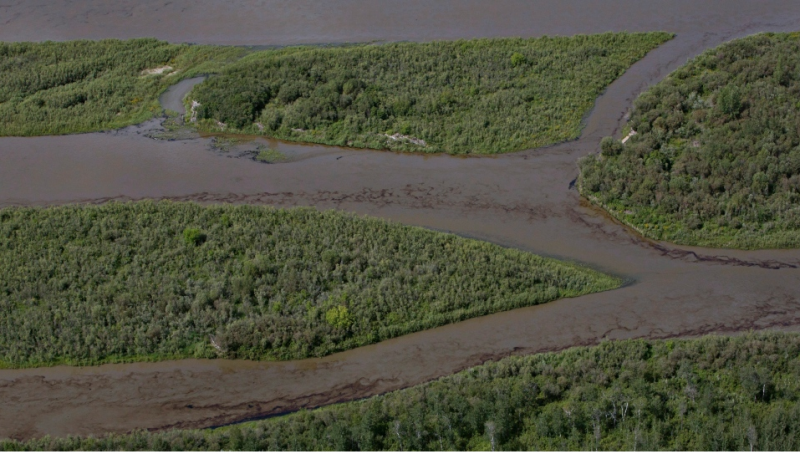
PRINCE ALBERT, Sask. – Communities affected by an oil spill in the North Saskatchewan River can expect precautionary drinking water measures to be in place for weeks or even months, says a Saskatchewan government official.
“It’s not going to be a short-term event,” Sam Ferris with Saskatchewan’s Water Security Agency said Monday.
“It could go on for some time.”
Two cities downstream from the Husky Energy pipeline leak near Maidstone, Sask., have stopped drawing water from the river.
North Battleford shut down its intake on Friday and is relying on a limited supply from wells.
Officials say the oily plume reached Prince Albert, a city of 35,000 people, on Monday.
Residents in the area are being urged to conserve water and not use that part of the river for recreation. Hospitals are looking at alternative water supplies.
Ferris estimates the water supplies of close to 70,000 people have been affected so far and that the slick has travelled about 370 kilometres.
About 200,000 to 250,000 litres are estimated to have spilled — the equivalent of two rail tank cars.
Lo Cheng with the federal department Environment and Climate Change Canada, said it’s investigating whether Husky broke any laws.
She also confirmed that some oil sunk below the surface of the river, complicating the cleanup job.
About 70,000 litres of an oil-soil mixture have been cleaned up around the source of the leak and another 118,000 litres of oily water has been skimmed from the river, but officials don’t know how much oil has been recovered.
Five booms have been placed on the river with “varied levels of success,” said Wes Kotyk with Saskatchewan’s Environment Ministry. He added that four birds, one frog and one fish have died as a result of the spill so far.
Calgary-based Husky, which is controlled by Hong Kong billionaire Li Ka-Shing, has apologized.
“We realize this has been a very challenging time for everybody, with the spill impacting people, the environment and local businesses,” said Al Pate, the company vice-president overseeing the response.
“We’re deeply sorry this has happened. We accept full responsibility for the event and for the cleanup and we will make things right.”
Pate said the breached pipeline was built in 1997 and was subject to a “rigorous” corrosion monitoring program.
The Federation of Sovereign Indigenous Nations is demanding representation at the command centre handling the spill. Chief Bobby Cameron said the Sweetgrass First Nation, Battleford Tribal Council and the Prince Albert Grand Council were preparing for the oil slick as it approached their communities.
The pipeline that leaked last Thursday runs from Husky’s heavy oil operations to its facilities in Lloydminster and carries oil mixed with a lighter hydrocarbon, called a diluent, that’s added to ease the flow.
Prince Albert’s city manager Jim Toye said its reservoirs had a two-day supply of water and the city could get permission from the province to tap its storm retention pond for treatment and distribution to add another four to five days’ worth of water.
Work was already underway to build a temporary pipeline stretching 30 kilometres to draw water from the South Saskatchewan River, should the water emergency continue for a longer period.
Prince Albert city council held a special meeting Monday and declared a local state of emergency, meaning city officials can issue $1,400 fines to businesses and residents using potable water unnecessarily.
The city also ordered there to be no outdoor irrigation, except if using reclaimed water; no washing of sidewalks, driveways, tennis courts, patios or other paved areas; and restaurants have been told to serve water only if customers request it.
“We need a deterrent,” he said. “We don’t want anyone thinking this doesn’t apply to them.”
— with files from MBC, CJWW